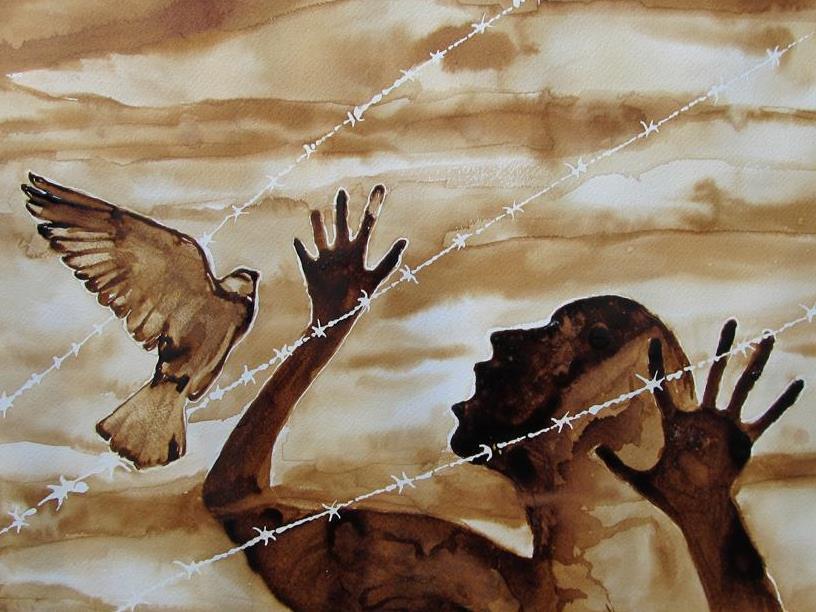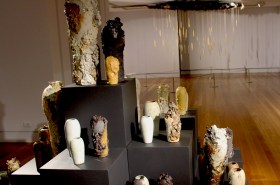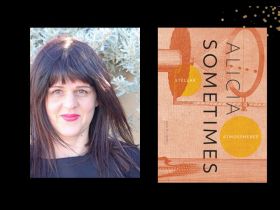Alwy Fadhel, ‘The Scream’, coffee on paper, 38x29cm. The Refugee Art Project
The attacks on arts organisations associated with Transfield Holdings ramped up this week. Four more artists withdrew from the Sydney Biennale, bringing to nine the number boycotting the event because of its partnership with Transfield. The Museum of Contemporary Art also came under fire for its relationship with Transfield, with a group of artists withdrawing from the MCA Zine Fair.
Concern about asylum seekers in detention centres run by Transfield Services is behind the boycotts. That concern intensified in the arts community this week when ArtsHub revealed some of the asylum seekers are artists escaping persecution.
In an effort to stem the damage, Transfield Holdings put out a clarification regarding its relationship with Transfield Services. The statement is worth exploring in detail because the moral culpability for the situation of asylum seekers in offshore detention facilities is of the highest importance.We are talking about human life.
Within the arts sector there is tremendous distress about the Government’s asylum seekers policy and the actions of those who implement it. This is why the sector is facing boycotts and disruption in an effort to force out a generous and long-standing arts partner. So we need to be clear to what extent Transfield Holding is implicated at any level in the chain of oppression resulting from the Federal Government’s asylum seeker policy.
Transfield Holdings is a private company owned by the Belgiorno-Nettis family. Transfield Holdings is the founding and major sponsor of the Sydney Biennale, with which it has a long and close relationship. It also has a smaller commitment to a number of other arts organisations: the Australian Chamber Orchestra, Sculpture by the Sea, Walsh Bay Sculpture Walk and the Museum of Contemporary Art.
Transfield Services is a public company which has the government contract to manage offshore detention facilities for asylum seekers, including the Manus Island detention centre where riots occurred two weeks ago, resulting in the death of Reza Berati and injuries to other asylum seekers.
Transfield Holdings floated Transfield Services in 2001.
According to Transfield Services’ statement this week, Transfield Holdings has about 12% of shares in Transfield Services, does not have a representative on the Transfield Services board, and has no influence on the business activities or decesions of the public company. As of the 2013 annual report, Transfield Holdings was the fourth largest shareholder in Transfield Services with 10.94% of shares, the others being 1 J P Morgan Nominees Australia Limited (17.29%), HSBC Custody Nominees (Australia) Limited (16.28%), and National Nominees Limited (15.47%).
But the relationship is made closer by history, personal relationships and because both Transfield Holdings and Transfield Services channel their philanthropic contributions through the Transfield Foundation, meaning that even if they have entirely separate projects they work closely together.
The two entities share an approach to philanthropy detailed on the Transfield Foundation’s website which, tellingly, includes the principle, ‘It is important that the Transfield Foundation’s programs align with the history, heritage and business activities of Transfield Holdings and Transfield Services.’ No distinction is made between the two companies.
The Biennale of Sydney in defending its relationship with Transfield Holdings has stayed well clear of the question of whether the corporate relationship provides its partner with any protection or whether Transfield Holdings is implicated in Transfield Services’ managing detention centres.
Rather the Board describes itself as ‘inadvertently caught somewhere between ideology and principle’, observing that, ‘The only certainty is that without our Founding Partner, the Biennale will no longer exist.’
Also noteworthy is that in defending Transfield Holdings non-involvement with the detention centres on the ABC’s PM program last night, the owner of Transfield Holdings and Biennale Chairman Luca Belgiorno-Nettis revealed a sympathy with Transfield Services that will win him no friends among protesting artists.
Describing himself as being ’on the sidelines’ and ‘barely talking to’ Transfield Services, Belgiorno-Nettis told PM, ‘Apart from the fact we’re not necessarily wanting to disassociate with them, because they’re doing nothing wrong anyway, in our view, but we’re taking all of this flak, I think, unwarranted.’
This statement effectively puts an end to the suggestion that Transfield Holdings is an innocent bystander to the corporate life of Transfield Services, a child much bigger and stronger than the parent. Whether Transfield Holdings could influence Transfield Services or not, Belgiorno-Netts has made it clear he has no wish to do so.
With multiple inquiries underway into the death of Reza Berati the cavalier statement that Transfield Services is ‘doing nothing wrong’ is, at best, premature. If, like many artists, you believe detention of asylum seekers is immoral and against international law, it is untenable.
The Biennale of Sydney will go ahead with Transfield Holdings as a sponsor and so will the MCA’s Zine Fair. As Fiona Menzies observes in her ArtsHub Opinion piece on the boycott issue ‘partnerships such as that between the Biennale of Sydney and Transfield are critical to the overall ecology and sustainability of our arts sector’.
But artists who don’t want to be associated with Transfield because it is implicated in the detention of asylum seekers have an entirely legitimate and ethical position.





